29. Sully
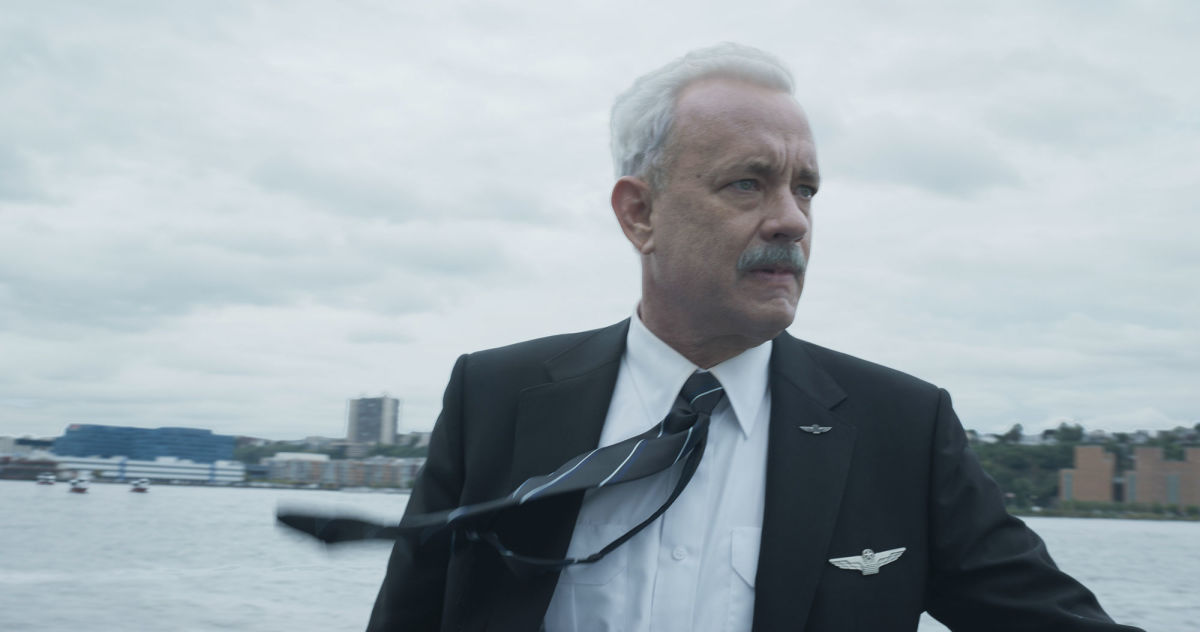
Like his many other films, “Sully” takes a look behind the scenes of a heroic man. This time it’s Chesley ”Sully” Sullenberger, who became famous when he was forced to make an emergency landing on the Hudson River in 2009, saving all the passengers. We see the psychological aftermath of the man due to the media frenzy, the probing of the National Safety Board and the event itself.
The film stands closer to Eastwood’s conservative leanings: it’s the individual versus the establishment. It’s the individual, who has learned the hard way through hard work, who has to show the establishment how it is really done.
The film lives and breathes on the restrained and solemn performance of Tom Hanks as the title character. This is not a typical heartwarming Hanks character; this is a stoic, private man who is suddenly unleashed into the public eye. The subtle ways in which Hanks expresses the discomfort of the situation, as well as the trauma and self-doubt that came after the incident, is astounding.
Not only that, even by knowing the outcome, Eastwood still manages to make the plane crash sequence suspenseful. The humanity that comes from the passengers – the little scene where a passenger offers to hold the baby of a mother – is also highly effective. It never gets too sappy, but Eastwood does give you plenty of room to cheer when everything goes well at the end.
The rest of the film, however, especially the plot surrounding the National Safety Board, is less effective. It’s also filled with unfortunate embellishment, due to Eastwood’s personal belief that the NTSB tried to ”railroad Sully into believing it was his fault.” Not only has the actual NTSB investigators opposed their portrayal, but even Sully has come to the defense of these men.
Nonetheless, even these embellished scenes are so solidly directed that it’s hard to get annoyed by them. But we have to be honest: from a lesser director starring a lesser actor, this film would have been easily forgettable.
28. Midnight in the Garden of Good and Evil
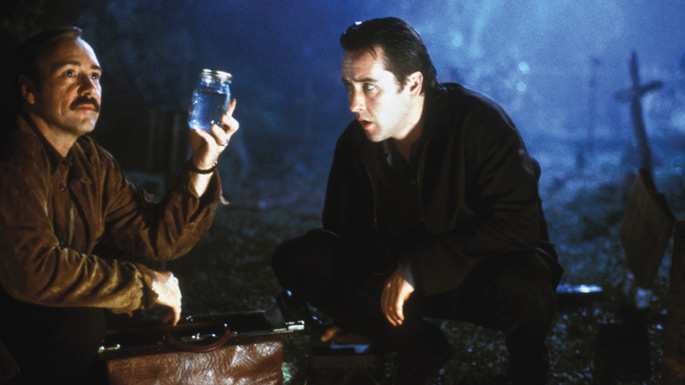
“Midnight in the Garden of Good and Evil” is the closest Eastwood will ever come to a Coen brothers film. Just like we’ve seen time and again from the Coen brothers oeuvre, this film is set in the south, parodying its culture while paying tribute to it, and filled with eccentric characters you’d imagine both Ethan and Joel would have a field day with. But its upfront style is definitively Eastwood and while the Coen brothers would swerve into surrealism and silliness, Eastwood plays it completely straight. It works in its own right, but one wonders whether it would have been served better by a different director, one that isn’t afraid to have fun with these cast of characters.
Based on John Berendt’s popular non-fiction book, the film follows John Kelso (John Cusack), a magazine reporter assigned to write about popular Savannah socialite Jim Williams (Kevin Spacey, who seem to have used this film to practice his Southern drawl for the ill-fated “House of Cards”). Kelso, being a New York liberal, often feels quite uncomfortable in the company of these gun-wielding Southerners.
Despite this, he finds kinship with Williams, falling for his eloquent dictionary and seemingly upfront manner. Kelso does witness an uncomfortable confrontation between Williams and a male prostitute, Billy Hanson (played briefly but poignantly by Jude Law), which seems to suggest a certain love affair between the two. Shortly thereafter, Hanson is shot dead and Williams is arrested for the murder.
Williams is abandoned by his socialite friends, who might have accepted his homosexuality within closed doors but can’t bring themselves to accept when it’s out in the open. Kelso decides to use this trial as material for his upcoming novel, becoming a close witness to the trial’s proceedings, even wanting to help prove Williams’ innocence. As he ventures into the inner world of Savannah, interviewing all manner of colorful characters, he also uncovers uncomfortable truths behind the politeness of its citizens, as well as its dark brand of justice.
The character of John Kelso was nonexistent in the book, but it’s understandable why he’s invented for the film as he is the framing device for the audience to discover this strange and sometimes sinister world. But the screenplay makes a mistake many historical movies make: if you invent a character for narrative purposes, at least make this character interesting or give him a decent arc. Cusack, through no fault of his own, fails to make any impression. There is a certain arc for his character, but it’s handled rather dismally. You don’t feel any emotional connection at the end of his journey and that’s what this film is missing the most: a central character to be emotionally invested in.
There is a budding romance between Kelso and local singer Mandy Nichols (played Eastwood’s daughter Alison), but it doesn’t feel remotely genuine. She just seems to be there just to give Kelso a romantic interest. Despite the obvious nepotism concerning Allison’s casting, she is charming in a rather thankless role (certainly more charming than Eastwood’s current prodigy Scott).
Another fault is the film’s running time, which clocks to about two and half hours. The film could have easily been trimmed and though the film is rarely boring, a tighter edit would make repeated viewings much easier.
Even so, the rest of the cast is all incredibly enjoyable. The standouts are Jack Thompson as Sonny Seiler, the defense attorney of Williams, who knows exactly how to pander to his Southern jury; a delightful and sometimes hilarious turn by The Lady Chablis, a drag queen and real-life resident (and character of the book); and the deeply underrated Irma P. Hall as the cackling voodoo witch doctor Minerva. The film lights up whenever these characters are on screen.
Despite its flaws, there is a lot to enjoy about this movie. There seems to be a genuine appreciation for the Southern Gothic culture, yet as we can expect from Eastwood, he refuses to romanticize it in any way. We can see its charms but also its backwards ways and the seething hypocrisy, especially within the Southern aristocracy. Yet it remains a seductive place, even when you’re aware of the dark undercurrents that runs through the hearts and minds of many of its residents. It’s a must see for anyone who enjoys a good Southern Gothic story.
27. Play Misty for Me
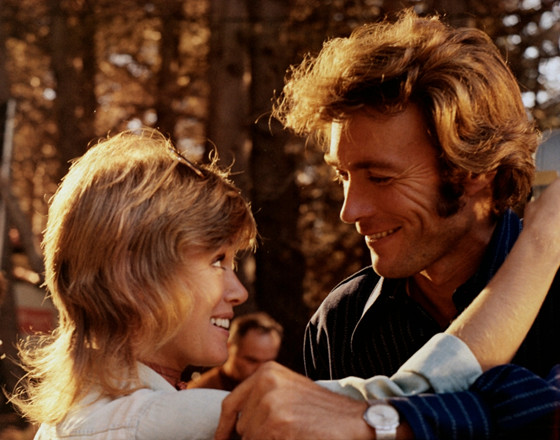
It’s always interesting to watch the first film of an acclaimed director and compare it to his later, often more accomplished work. In doing so, it becomes apparent that you can’t judge a director from his first movie. Nobody who saw “Bad Taste” – which I personally adore – would ever think Peter Jackson would one day win an Oscar.
Sometimes you see flashes of the brilliance, the beginnings of greatness that is there somewhere, but which needs to mature – such as Stanley Kubrick’s “Fear and Desire.” But sometimes it’s already there, such as with Ridley Scott’s “The Duelists” or with Eastwood’s “Play Misty for Me.”
“Play Misty for Me” might not his greatest film, but it already showed a director who’s confident in his abilities and effective in his economy. Like he would time and again, this first film was finished under budget and ahead of schedule. This is the result of not only ambition, but careful mentoring from directors such as Sergio Leone and Don Siegel (who cameos as a bartender, which made this film his acting debut). It’s not a perfect film by any means, but as with so many of Eastwood’s films, it’s an incredibly effective film.
Dave Garvey (Eastwood) is a Californian radio DJ who spends the night with one of his fans, Evelyn Draper (Jessica Walter), who calls his show anytime to request the song “Misty” by Eric Garner. While she seems nice at first, there are a few warning signs: a quick-fired temper and a lack of understanding of certain boundaries. It becomes increasingly clear to Dave that she imagines a deeper relationship than what he had originally envisioned. But no matter how hard he tries to get rid of her, she returns to him with moods that can quickly switch from suicidal depression to psychotic rage.
The film is a straight-up psycho-thriller that, even by today’s standards, has moments of surprising terror. This is all due to the magnificent and scary performance by Walter, whose scream will haunt you at the end of the film. Eastwood does an excellent job but she’s undoubtedly the star of the film.
Originally, Eastwood wanted Steve McQueen as Garvey but he declined, stating that the female role was much stronger than the male role. This is similar to how many film stars declined the role of Paul Sheldon in “Misery,” fearing that they would be upstaged by the character of Annie Wilkes (who would eventually be played by Kathy Bates). There is some similarity between Walters’ and Bates’ performances. From the beginning you have this feeling that there’s something wrong with them, despite their charms and seeming friendliness.
There’s something tragically human about them. At times you even feel sorry for them. You know that if one thing could have been changed about their mind or circumstances, they would have gone on to become better people. But when these characters finally reveal the extent of their madness, it’s scarier than anything you will see in a mainstream horror film. And when the hero of the film finally does fight back, you will cheer until the end.
The violence is minimal but memorable. Eastwood applies uncomfortable close-ups where you feel the disorientation of the victim as well as the psychotic mental state of Evelyn. It’s a smart device for these scenes, without needing to resort to over the top gore.
One must remember that this film is obviously a product of its time. Some parts are very dated, more so than any other Eastwood film. There’s certainly a charm to its datedness but considering the subject matter, the cheesiness can distract from it. There are some hokey parts as well and some scenes drag a little; the lovemaking scene between Eastwood’s character and his girlfriend (Donna Mills) goes on way too long, despite the good music that plays in the background.
There is also a severe lack of background on the film’s central villain. Perhaps the mystery is better, such as with Michael Myers, but a little background, just a hint of where this demented woman came from, would have given the film more weight. A little insight in her history; for instance, were there more victims? Was she unloved in the past? Perhaps she deserved a few last words of sorrow before she plunged to her death?
Nonetheless, it’s a solid debut from a director who would eventually become one of the best in the business.
26. Bronco Billy

“Bronco Billy” could be considered a parody of Clint Eastwood’s western persona. Instead of the Wild West, this film is set in the modern day, where our hero, ‘Bronco’ Billy McCoy (Eastwood), is a circus performer whose act is all about being the “fastest gun in the west” and who “never misses.” He proves this by shooting plates in the air and throwing knifes at his assistant while she is attached to a revolving wooden disc. We can already see from the beginning that, sadly for his assistant’s leg, he has the ability to ”miss.”
Billy must quickly find a new assistant since the show is also rapidly losing money, much to the chagrin of his circus troupe, who complain that they haven’t been able to afford their preferred amounts of drinking and whoring. He eventually finds an assistant with cold-hearted heiress Antoinette (Sondra Locke), who reluctantly married a sexually-frustrated goofball John (Geoffrey Lewis, an Eastwood regular) so that she could inherit a large fortune.
When she coldly and humorously refuses John’s advances during their honeymoon, he steals all her money and leaves her in the middle of nowhere. Being desperate, joining Billy’s circus is the only recourse she has left. At first she hates doing this but she turns out to be a great assistant, despite not sticking to the script. As you can expect, Billy and Antoinette fall for each other and during this time, much silliness ensues.
Though Eastwood is able to shoot a few people and show off his “fast hand,” this film is far removed from the gritty persona Eastwood had developed by this – though before this film, he had shown his lighter side with his two monkey movies. It’s a lighthearted film, basically a romantic comedy that works because all the characters are fun, especially his circus troupe which includes such performers such as Scatman Crothers and Bill McKinney.
Eastwood showed before that he has great comic timing, but his role might be his funniest performance – apart from Gunnery Thomas Highway. The third act is rather predictable, turning the film into a basic romantic comedy. This was also part of his six-time partnership with Locke and in my opinion, their chemistry works best in this film, mostly because the breezy nature of this film allows the two actors to have fun in their respective parts. It might be minor Eastwood work but as we know, even his minor work is highly recommendable.
25. The Rookie
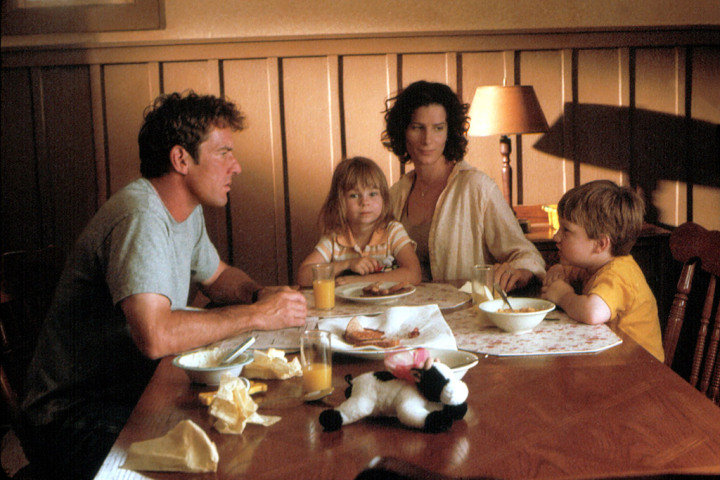
This often forgotten remnant of 80’s buddy cop movies has a lot to offer, even if it does have some problems. The biggest problem is that it’s just terribly predictable and has nothing new to offer the genre. It feels rather schlocky, even has a sleazy feel to it – especially the rather awkward scene where Eastwood’s character gets raped by the villain’s henchmen Liesl (Sonia Braga).
Despite all this, all the actors perform their trademark acting skills with vigor and even though you know where all of this is going, you aren’t bored one second along the way. The dialog is stereotypical mismatched buddy cop material: ”Do you think I like dragging around after you all day?” says the rookie, which he follows up by telling him several reasons why he hates him (one of them being his whiskey breath) to which the veteran replies: ”And I hate your uptight regulation boyscout horseshit!”
Or we can’t forget the lovely anti-PC dialog: ”What made you think a dumb Polack like you could outsmart someone like me?” says the villain (Raul Julia), to which the hero says: ”Well, it’s just that the arrogant Kraut like you was in the firing line.” Great stuff.
The action sequences are deliciously over the top, and dumb enough to merit this film as an excellent candidate for beer-fueled Saturday night entertainment.
All the players are performing their trademark acting skills perfectly. Eastwood is the grizzled veteran who doesn’t give a fuck. Charlie Sheen is the Rookie, who has that boyish charm and comic timing that makes him a perfect counterpart to Eastwood’s character. And then there’s Julia as an accent-speaking villain who chews the scenery whenever he appears.
This is not the profound Eastwood many know and love. This is schlocky Eastwood and I fucking love it.
24. American Sniper
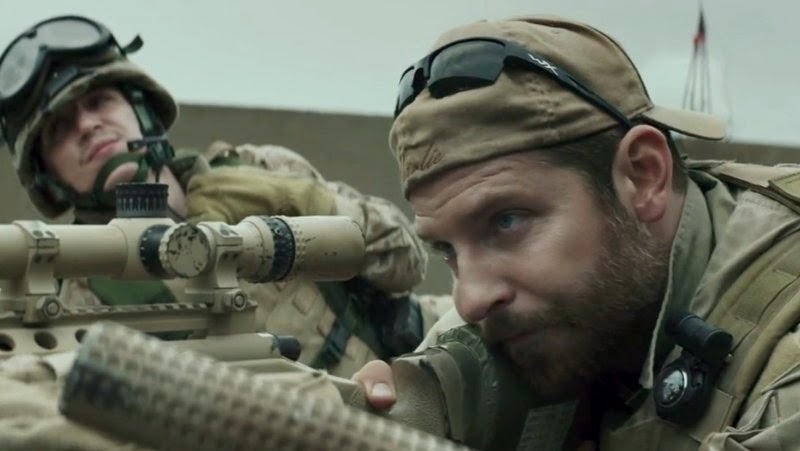
Chris Kyle was a liar, let’s establish this fact. His memoir, while gripping, is tainted with painful and at times inexplicable bullshit. He might have been a patriot who bled and nearly died for his country, but for some reason felt it necessary to lie about his stature as a soldier. He not only exaggerated his already noteworthy track record as a sniper, but even lied about the Medal of Valor he received in the process. His memoir has even been the subject of a defamation suit regarding a sequence in the book in which Kyle punched a celebrity.
The celebrity was unnamed in the book but when Kyle was promoting the book, he identified the unnamed celebrity to be none other than the sexual Tyrannosaurus himself: Jesse Ventura. Ventura won the case, earning $1.2 million in damages.
The film detracts from the source material, but not in the sense that it becomes more historically accurate. In fact, it doesn’t. The screenplay makes the real Kyle more sympathetic, giving him PTSD, while the real life Kyle was more bloodthirsty and showed no remorse for his actions in combat.
The film’s criticism on its historical accuracy notwithstanding, this film received much more outrage for its depiction of the Iraq War. The reason for the Iraq War is fraught with moral complications but the film was never about that. The film didn’t need to be about that. The film is about one person’s experience in the war. The perspective of this particular soldier might not be favorable to the viewer, but it doesn’t need to be. The perspective of Henry Hill was not very moral either, but that’s because he was a gangster. If we can accept Henry Hill, surely we can accept this fictional Chris Kyle?
If you can look past the setting of the war, the political and moral reasons surrounding the war, the scene where Kyle holds a fake baby (which really looks fake), and the film’s abundance of factual inaccuracies, you have an extremely effective character study. One of the best depictions of a soldier suffering from PTSD. From that perspective, the film is certainly successful.
The action scenes are tense and shocking, and the final battle is admittedly crowd-pleasing. If the film didn’t lend itself to be a true story, it might have been ranked higher. If it was just marketed as a fictional film, changed the main character’s name and the ending, it wouldn’t have compromised itself on the facts, nor would it have compromised the film’s central message.
23. True Crime
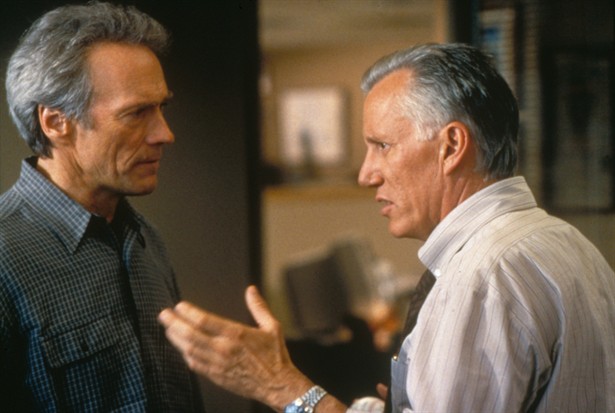
The ‘true crime’ in question is when the innocent are tried for crimes they didn’t commit. We know this has happened in America numerous times and we know that this is probably still happening. The justice system is flawed; if you’re guilty but you have high-priced lawyers, there is a good chance you can evade justice.
Even if you have to do time, you will do your time in a more leisurely fashion. Cops are underfunded, they are pressured to keep their crime statistics down, and they have better things to do than to worry needlessly whether the system really works. If they can push someone to confess they can move on. Lives are thrown away inside a small room. They scratch their names on the brick walls, they think of what could have been, they dream of fresh air.
“True Crime” is about the possible innocence of a man named Frank Beechum (Isaiah Washington), who’s sentenced to death for the murder of a pregnant grocery clerk. An alcoholic journalist Steve Everett (good old Clint) is assigned to write a story about Beachum. Everett begins to suspect Beechum’s innocence and begins investigating the case himself.
The film has a wonderful supporting cast, from Denis Leary as hapless editor Bob Findley, the husband of the woman Everett has been sleeping with; Bernard Hill as the kindly warden Luther Plinkett; the late great Michael Jeter as Dale Porterhouse, a witness to the case; Diane Venora as Everett’s estranged wife; and Michael McKean as a sensationalist reporter. But if anyone steals the show, it’s James Woods as Everett’s editor-in-chief. Both Woods and Eastwood share hilarious banter in this film.
“True Crime” is just a prime example of a slick Eastwood film; it’s smart, funny, thrilling and wickedly honest. The message of the troubled legal system of America, the unforgivable crime of the innocent being punished by it, remains poignant. The final scene where a poignant emotion is expressed through a simple nod perfectly sums up Eastwood’s effective directing: it gets to you without needing to get all sappy about it.
22. Jersey Boys
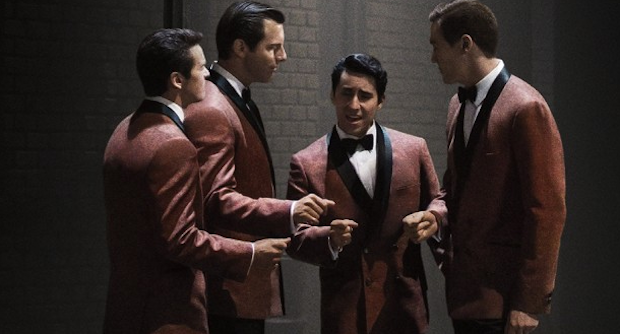
Clint Eastwood doesn’t seem like the ideal candidate to do a big-screen adaptation of the Tony Award-winning musical “Jersey Boys,” but we got one, and the results were controversial for many. The last time Eastwood did a musical was in the hilarious (and sometimes cringe-worthy) “Paint Your Wagon” with Lee Marvin. If you think “Jersey Boys” will be a throwback to the classic musical you will be mistaken – and many were therefore highly disappointed.
That’s the thing that made “Jersey Boys” controversial: it subverted the original lively play by staying true to the rivalry and pettiness that went on behind the scenes of the infamous Four Seasons. All four players talk right into the camera, giving their view of the events as they descend into fame. They are all excellently played by Vincent Piazza as Tommy DeVito (who shares the same name as Joe Pesci’s villainous character in Goodfellas), John Lloyd Young as Frankie Valli, Erich Bergen as Bob Gaudio, and Michael Lomenda as Nick Massi. There is also excellent support by Christopher Walken as their local wiseguy and mediator Gyp Decarlo (the end credits where all the characters are dancing includes Walken in great form).
As we can expect from Eastwood, the culture of these Italian-Americans is done respectfully and accurately. It never feels like we are watching caricatures. The famous music is also there and all of the players do a standout job. It might not have the liveness of the original play but it wasn’t supposed to. Eastwood wasn’t interested in the glitter and gloss of this story. He wanted to tell the real story behind these charming rogues, showing that media appearances and the pretty album covers weren’t telling the real story.
For me and many others, this was a much more interesting adaptation than what other more superficial directors would have done – I shudder at the thought of Baz Luhrmann adapting this.
21. Invictus
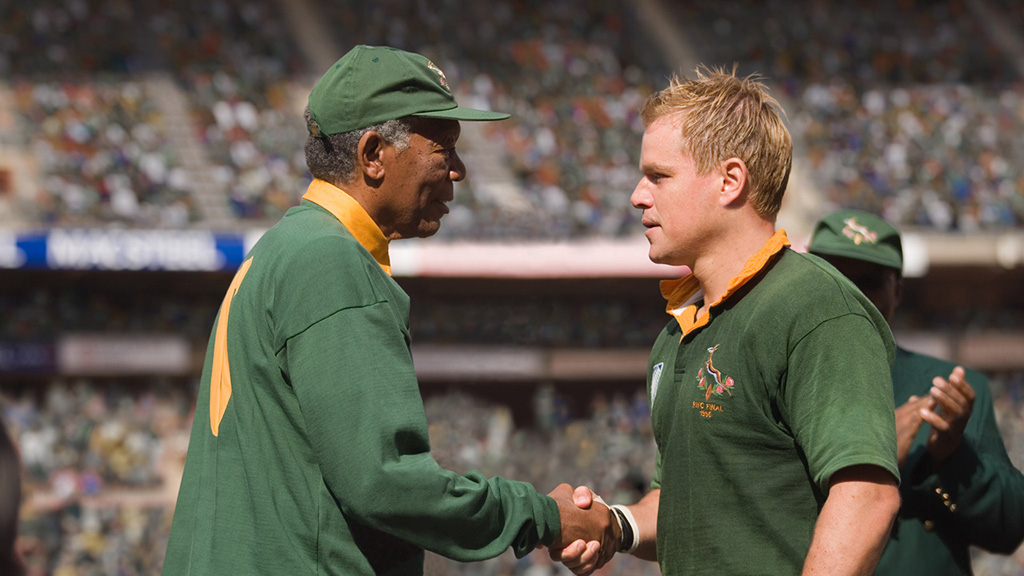
Nelson Mandela is a legendary figure, a symbol of everything we want from our leaders. Naturally there is darkness, some seediness behind the real public figure. Nobody’s perfect. There are always some dark hang-ups. Some are even so dark that it completely derails the previous image of the leader, such as Gandhi’s conduct among his wife and women, or his religious fanaticism that would have caused massive suffering would he have ruled. Does that mean Richard Attenborough’s thoughtful biography “Gandhi” should be dismissed? Nope, not at all.
When it comes to Mandela, just like Gandhi, they do symbolize something inherently needful in our leaders: compassion, strength and conviction. We don’t want politicians, we want leaders. We want to be inspired, to have hope for the future. It’s much easier to make demons out of people than to bring people together and investigate what makes them demons.
“Invictus,” however, is not a biography of Nelson Mandela. It’s more of a snapshot of his life, from the moment after he was elected president of South Africa. Based on John Carlin’s book ”Playing the Enemy: Nelson Mandela and The Game That Made a Nation,” the film is focused on Mandela’s efforts to bring the nation together by publicly supporting the Springboks rugby team, a team whose supporters are generally antagonistic against Mandela.
There is effort from Mandela’s supporters to change the emblem and the name, but Mandela opposes this much to chagrin of his supporters. He even wishes to have the Springboks win the Rugby World Cup and meets up with its captain Francois Pienaar (Matt Damon), hoping to inspire him so that Pienaar will inspire his teammates. Mandela knows that the victory of the Springboks could have the opportunity to unite people, which in turn will symbolize a hopeful start of his presidency.
The legendary Mandela is played by Morgan Freeman, someone that according to the man himself, was the only person who could play him. Watching his performance, it’s impossible to deny this. From the way he speaks to his mannerisms, the way he waves to his people, the humble smile, it’s all there. Freeman is a film star, but in this movie you don’t see Freeman – you see the great Mandela.
The best parts of the film are the scenes with Mandela. It’s not just his wise words spoken with eloquence and conviction bound with his thick South African accent; it’s in the moments when he talks to people, looking at you with his soulful eyes as he listens to your every word.
It seems like he’s fully aware of his power for empathy and leadership and you see how hard he works at making a positive change. It’s a humongous responsibility that comes with the price of time and eventually his health. Through this film you understand why this was such a presence to bear, why people are impressed, and why he became a symbol for the nation and civil rights.
In one scene, Francois visits his prison, the small confinement that shaped his conviction. It made him fearless; when he walks past a crowd of people, he’s unperturbed by the hail of boos. He was beaten but his spirit could not be broken. There’s nothing that can stop him from his mission to do what he feels is right for his people.
The plot involving the rugby team is less interesting, however. The importance is stressed but even with Damon’s charismatic turn, we just want to be with Mandela again and see what he’s up to. Eastwood directs the sports scenes with effective verve but it feels like we could had an even greater movie if it just focused on Mandela alone.
So is this a glorified portrayal of this great man? Perhaps, but just like Ben Kingsley’s turn as Gandhi, the attraction is undeniable. This is the kind of man you’d follow into the depths of hell and that’s because this is a man who made you feel that heaven on earth was possible.
20. J. Edgar
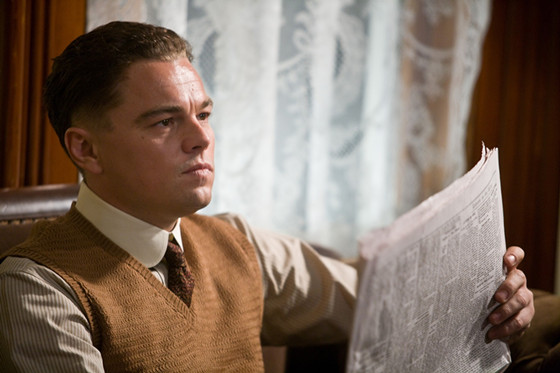
The legacy of J. Edgar Hoover is a complicated one. He was the first ever director of the Federal Bureau of Investigation where he had abused his position of power in multiple ways. His pursuit to chase down the communist problem would sow the seeds of McCarthyism, his refusal to admit to the existence of the Mafia would ensure that organized crime would thrive for decades, and his antagonism against civil rights leaders such as Dr. King is less than noble. Nonetheless, this was a complicated individual and though Eastwood is not entirely successful into exploring his psyche, there’s lot to admire from this flawed film which stars Leonardo DiCaprio as the famous FBI director Hoover.
There’s the case of his closeted homosexuality, which Eastwood portrays tastefully through Edgar’s relationship with Clyde Tolson (Armie Hammer). There’s the pettiness of his character, his deep belief in what he was doing, his complicated relationship with his mother Annie Marie Hoover (played with natural sophistication by Judi Dench). But the life of Hoover was probably too great and complex to portray accurately on screen even for its two hour running time.
There’s so much that is left on the cutting room floor, so many more interesting aspects of his life that could be explored. So many scenes in his life can make him seem intolerably unlikeable, and the script has a decent balance where it doesn’t dance around his innate flaws nor does it demonize him entirely – it’s certainly a more fair representation than what Oliver Stone gave us in “Nixon,” even if Bob Hoskins did an outstanding job.
Much has been made with the lackluster makeup effects to make both Leo and Armie look older, but I would personally look past this, even if it can be occasionally distracting. Eastwood always seems interested in the true face of great men. We see it in this film, in the way Hoover created his false persona for the media. Perhaps this is the greatest story one could tell of Hoover on screen. It will probably be the closest we’ll ever get to understanding him.